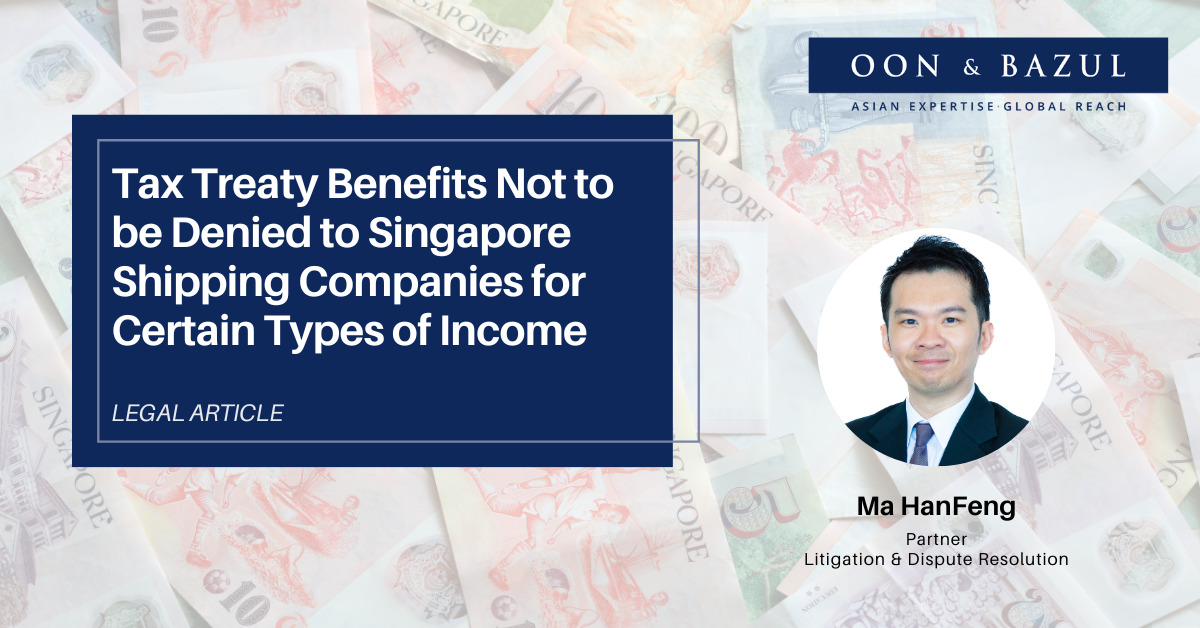Tax Treaty Benefits Not to be Denied to Singapore Shipping Companies for Certain Types of Income
Introduction
In an increasingly globalised world, companies may encounter instances of double taxation on the same income, due to the different corporate income tax rules applied by different jurisdictions. These differences in tax rules can extend to even fundamental issues, such as the basis of corporate income taxation applied by each jurisdiction.
For instance, in India, an Indian resident company is taxed on its worldwide income. A non-Indian resident company is taxed in India only on income that is received in India, or that accrues or arises, or is deemed to accrue or arise, in India. On the other hand, in Singapore, income tax is levied on both: (a) Singapore-sourced income (accrued or derived from Singapore); and (b) non-Singapore sourced income which is received, or deemed to be received, in Singapore – this applies regardless of the residence of the companies.
To relieve/mitigate the impact of double taxation, various countries have entered into tax treaties with each other, with the aim of promoting cross-border trade/investments.
The Indian tax decisions
Notably, there are a series of Indian tax decisions whereby the Indian tax authorities had attempted to use the “Limitation of Relief” clause under the Singapore – India tax treaty to deny tax treaty benefits to Singapore shipping companies. However, at appellate level, courts have ruled in favour of the taxpayers.
For instance, in the case of MT Maersk Mikage [2016] 72 taxmann.com 359 (Gujarat), while defending its claim for tax treaty benefit under the Singapore – India tax treaty, the company was able to show that the income in question would be assessable in Singapore on an ‘accrual basis’. The Honourable Gujarat High Court held that the “Limitation of Relief” clause in the Singapore – India tax treaty was not applicable to the income in question and accordingly, decided the matter in the company’s favour.
A similar view has been taken by the Honourable Income-Tax Appellate Tribunal (ITAT) in other cases also: APL Co. Pte. Ltd. [2017] 78 taxmann.com 240; Bengal Tiger Lines Pte. Ltd. [2020] 121 taxmann.com 165; Alabra Shipping Pte Ltd. [2015] 62 taxmann.com 185 (Rajkot. – Trib.); and Far Shipping (Singapore) Pte. Ltd. [2017] 84 taxmann.com 297 (Hyderabad – Trib.) (SMC bench).
It is also worth noting here that despite such court rulings, there have been instances where the Indian tax authorities have denied Singapore shipping companies the tax treaty benefits, by relying on the “Limitation of Relief” clause in the Singapore – India tax treaty. Such matters are now before the Honourable Income-Tax Appellate Tribunal for adjudication and their verdicts are awaited.
Takeaway Points
The key takeaway points from these Indian tax decisions are as follows:
- The “Limitation of Relief” clause under the Singapore – India tax treaty applies only to limit the tax treaty benefits in respect of income which is taxable in Singapore on a receipt basis (i.e., non-Singapore sourced income which is received or remitted to Singapore.
- However, this “Limitation of Relief” clause does not apply to limit the tax treaty benefits in respect of income which is taxable in Singapore on an accrual basis (i.e., Singapore-sourced income).
- In other words, the Indian tax authorities should not deny a company tax treaty benefits on the basis of this “Limitation of Relief” clause, so long as the income in question is considered Singapore-sourced income.
- Based on the Indian tax decisions, if a company can show that the income in question is Singapore-sourced income, the Indian tax courts/tribunals are likely to rule in favour of the company by allowing it to claim the tax treaty benefit under the Singapore – India tax treaty.
- As for the issue of whether the income in question is considered Singapore-sourced income, this is to be determined based on Singapore tax law.
This legal article was jointly authored by Partner, Ma HanFeng, along with Sanjay Sanghvi and Raghav Bajaj from Khaitan & Co, India.
If you require any legal advice or assistance with Singapore corporate tax related matters, do not hesitate to contact Ma HanFeng.
For queries on Indian tax related matters, do not hesitate to contact Sanjay Sanghvi or Raghav Bajaj from Khaitan & Co, India.
Additionally, you may also visit our Tax page to learn more about our practice.
You may download a PDF copy of this article here.
The above content is for general information purposes only. It is not and does not constitute nor is it intended to provide or replace legal advice, a legal opinion or any information intended to address specific matters relevant to you or concerning individual situations. Should you require specific legal advice, please do not hesitate to contact the Partner listed or your regular contact at the firm. Copyright of Oon & Bazul LLP and Khaitan & Co, India.



